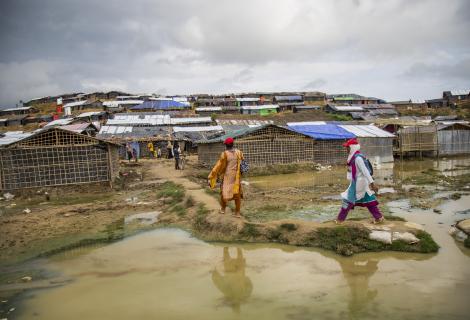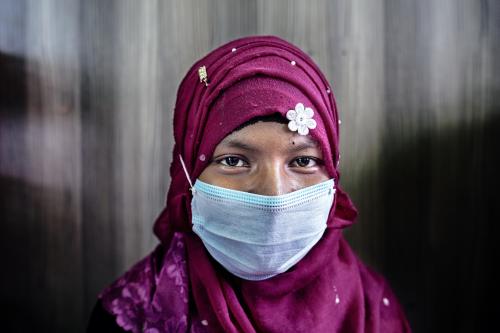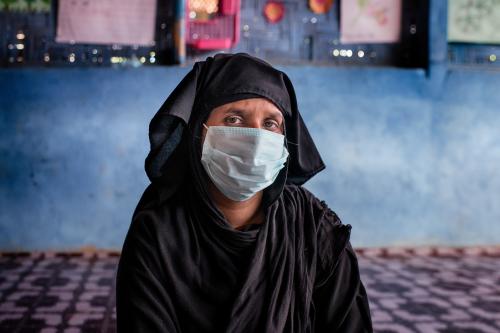Stuck in limbo: The Rohingya Refugee Crisis, three years on

By Faria Rashid, advocacy coordinator at ActionAid Bangladesh, and Etienne Berges, policy and advocacy adviser at ActionAid Myanmar
Heavy monsoon rains are pounding the Rohingya refugee camps at Cox’s Bazar, flooding the crowded settlement and destroying makeshift homes. It is yet another hardship testing the resilience of communities as they battle the Covid-19 crisis and three years stuck in limbo.
In August 2017, hundreds of thousands of Rohingya refugees fled unimaginable violence in Myanmar’s Rakhine province, crossing the border into Bangladesh in search of safety.
Now, more than 860,000 people live in the camps at Cox’s Bazar, making them the largest refugee settlements in the world.
Rohingya refugees remain in a precarious situation. As they have not been formally granted refugee status, they are unable to integrate into Bangladesh communities and start to rebuild their lives. Unless their safety in Myanmar can be assured, they remain fearful of returning.
In Myanmar, the safety and human rights conditions for the remaining Rohingya communities have continued to deteriorate. Conflict between the Tatmadaw and the Arakan Army has displaced over 80,000 people throughout Rakhine, including thousands of Rohingya in northern areas of the state, with an increased use of landmines.
Ahead of Myanmar’s November elections, Rohingya Muslim communities in rural villages and internment camps in central and northern Rakhine State have reported the absence of voter lists in many areas. This means that they can't register to vote.
Rohingya communities in central and northern Myanmar also remain extremely vulnerable to a potential Covid-19 outbreak, with identified cases on the rise.
Coronavirus has also reached the refugee camps at Cox’s Bazar, where the pandemic is presenting a huge threat in the overcrowded settlement and where recent flooding and heavy rains could lead to the virus spreading faster.
Farah Kabir, country director of ActionAid Bangladesh, has warned that Covid-19 could ‘spread like wildfire’ through the crowded Rohingya camps. ActionAid has been working in the camps throughout the pandemic to provide life-saving public health messages about how to stop the spread of coronavirus.
We're providing hygiene advice and mask-making training so that Rohingya women, like Hazera, can protect their families and communities from the virus.

“I made masks after completing a mask-making workshop. I have learned many things about how to protect myself from Covid-19,” she says.
The women making masks in our workshops are helping to meet the demand for personal protective equipment (PPE) and earning an income through the production.
Levels gender-based violence are also rising due to the Covid-19 lockdown. Nusema is living in a two-room shelter with eight members of her family. She told us that because of the lack of food and work, “the men are always frustrated and angry”.

ActionAid has set up women-friendly spaces, where women can receive advice and support. Sharmin works in one of these centres, where she is helping Rohingya women who are at risk of domestic violence.
“I am working hard to provide my service. I am proud that I am able to support one of the most vulnerable populations,” she says.
While the future remains uncertain for Rohingya refugees, their resilience in facing multiple crises and persecution is remarkable. ActionAid Bangladesh is hosting a two-day conference to mark the third anniversary of the beginning of the Rohingya Crisis. This will bring together members of the Rohingya diaspora living around the world to discuss how to jointly push for justice in Myanmar and better inclusion in host countries.
- For more details about the conference, Connecting the Rohingya Diaspora: Highlighting the Global Displacement, hosted by ActionAid Bangladesh in collaboration with the Centre for Genocide Studies at the University of Dhaka, and the Centre for Peace and Justice at Brac University, visit https://actionaidbd.org/rohingya-conference
Covid-19 Appeal
Our local teams have already reached five million people across 40 countries, from distributing millions of food packages to funding life-saving women’s shelters.
But this crisis is far from over. And we urgently need your help to support the world’s most vulnerable communities.